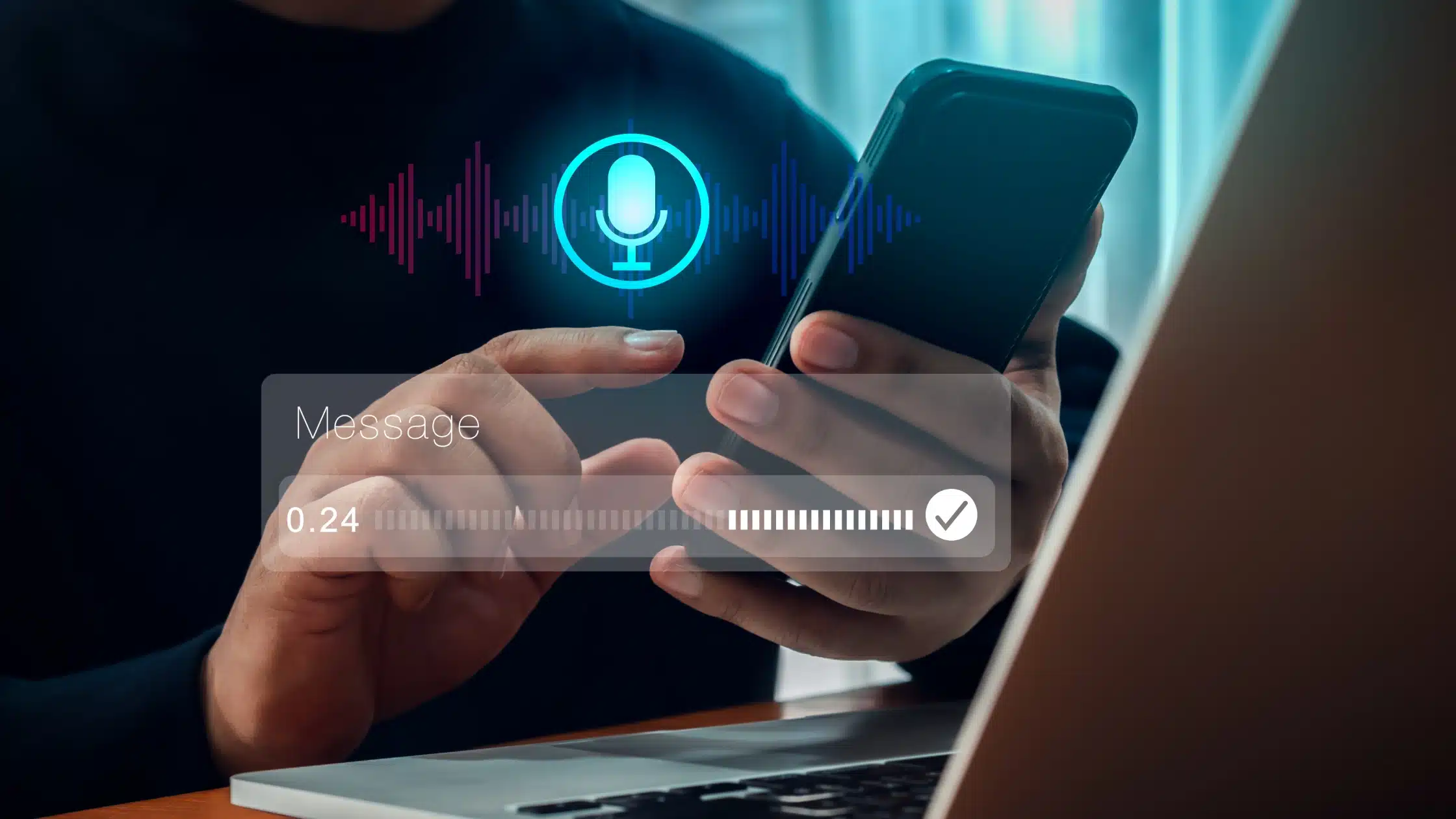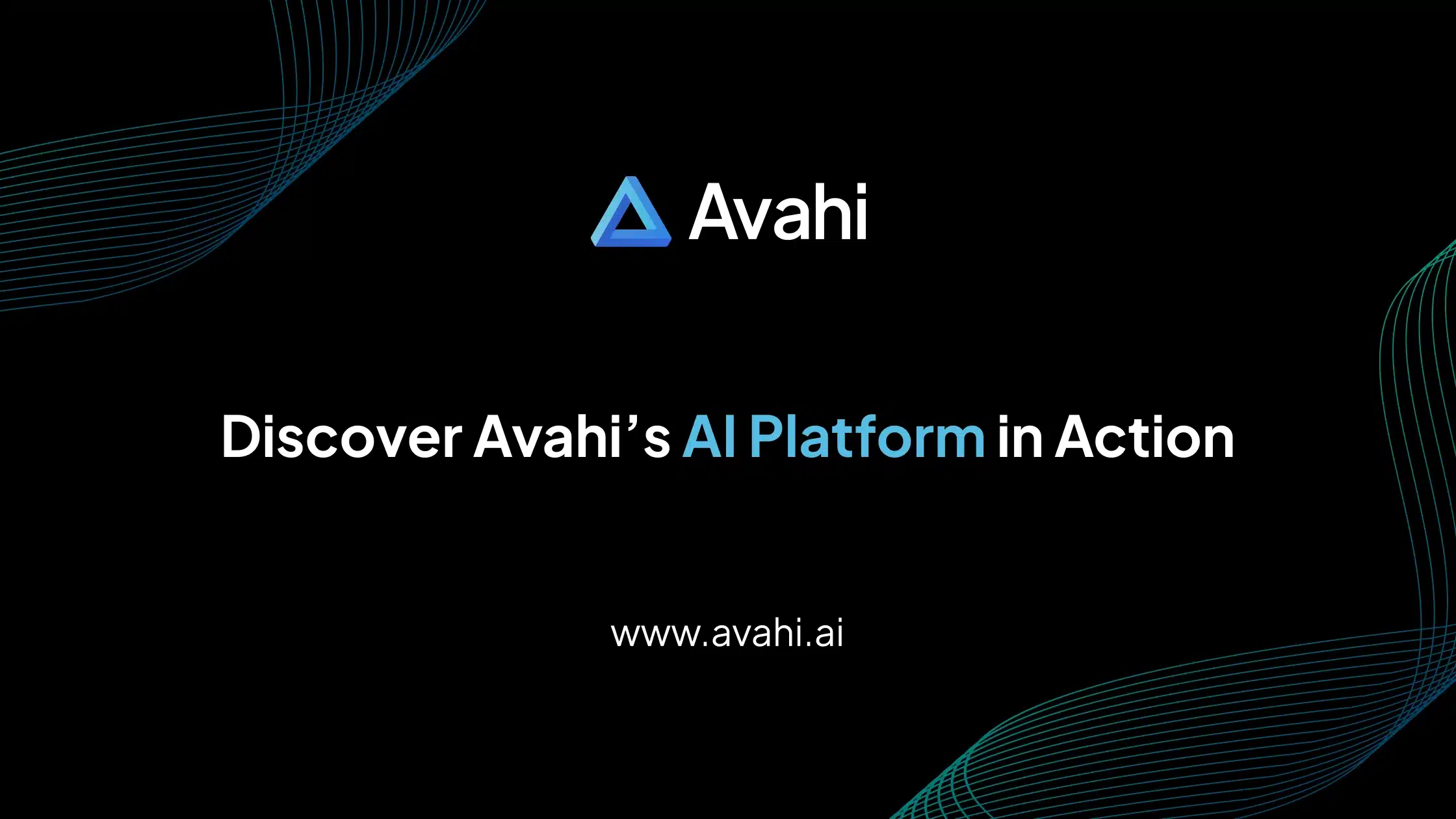TL;DR
|
A patient calls your office with a simple request to book or change an appointment. But the call goes unanswered. The appointment is missed. The patient feels ignored, and your team scrambles to catch up.
A report by the American Chiropractic Association notes that small healthcare practices miss up to 30% of incoming calls during office hours. Worse still, missed appointments account for nearly 20% of scheduled visits, negatively impacting both patient care and your bottom line. And with administrative teams spending almost half their day managing calls, it’s no wonder practices are searching for more innovative solutions.
Technology is stepping in to help. AI-powered voice agents are transforming the way healthcare providers communicate with patients, making appointment scheduling faster, easier, and available 24/7. By handling routine calls, reminders, and inquiries, these tools free up staff, reduce stress, and ensure that patients feel supported throughout their care journey.
In this blog, we’ll explore how Avahi AI Healthcare Voice Agents are redefining patient communication, helping practices stay organized, responsive, and focused on delivering exceptional care.
How They Operate and Why They Matter
AI voice agents for Appointment Scheduling are software systems powered by artificial intelligence that manage appointment-related tasks through voice interactions. These systems allow patients to schedule, reschedule, or cancel appointments by simply speaking to the system. Voice agents are designed to understand spoken language, process requests accurately, and respond in real-time. By automating routine appointment tasks, they reduce the dependency on administrative staff, lower the chances of human error, and provide patients with a faster and more convenient experience.
Here is how they operate to make appointment scheduling faster, more accurate, and convenient for both patients and healthcare providers:
Natural Language Processing (NLP)
NLP is a core technology that enables AI voice agents to understand the meaning behind the words patients speak. It allows the system to interpret various ways of requesting the same task, handle common language variations, and provide accurate responses.
This ensures that the voice agent can understand patient requests even if they are phrased differently or include pauses, hesitations, or informal expressions.
Machine Learning
Machine learning allows the AI voice agent to improve over time. As more interactions are processed, the system learns from past requests, patterns, and corrections to better understand patient preferences and scheduling needs.
This continuous learning helps the voice agent provide more accurate responses and offer personalized suggestions, such as recommending suitable appointment slots based on the patient’s past behavior.
Speech Recognition
Speech recognition enables the AI system to convert spoken words into text that it can process. This technology ensures that the voice agent can accurately capture patient commands, even with variations in pronunciation, tone, or speed.
By accurately recognizing speech, the system becomes more accessible to a broader range of users, including those with diverse accents or speech patterns. This makes appointment scheduling easier, faster, and more inclusive.
How Do AI Voice Agents Differ from Conventional Communication Methods?
Below is a detailed comparison highlighting the differences between AI voice agents and conventional communication methods in appointment scheduling.
1. Conventional Communication in Scheduling
Manual Handling
In conventional scheduling systems, patients are required to speak directly with office staff to book, reschedule, or cancel appointments. This process relies heavily on human availability and requires patients to call during business hours.
When staff members are busy or unavailable, patients experience delays, and appointments may be scheduled incorrectly or forgotten.
Time and Resource Intensive
Managing appointments through human interaction demands considerable staff involvement. High call volumes, patient inquiries, and scheduling adjustments require extra time and effort from administrative teams. This can lead to bottlenecks, longer wait times, and increased operational costs for healthcare facilities.
2. AI Voice Agents
Automation
AI voice agents can handle appointment-related tasks without requiring human assistance. Once set up, they can process patient requests instantly and manage routine scheduling activities automatically. This reduces the burden on office staff and helps streamline the entire appointment process.
Real-Time Interaction
AI voice agents are available 24/7, allowing patients to schedule or modify appointments at their convenience. This 24/7 accessibility removes the constraints of office hours, ensuring that patients can access scheduling services whenever needed, without waiting for staff availability.
Personalized Experiences
Voice agents can access patient history, preferences, and prior interactions to offer personalized recommendations. For example, the system can suggest suitable appointment times based on the patient’s schedule or remind them of regular check-ups. This makes the experience more user-friendly and efficient.
Comparison Table: AI Voice Agents vs Conventional Communication Methods
| Feature | AI Voice Agents | Conventional Communication Methods |
| Interaction Type | Automated voice-based interaction | Requires human interaction |
| Availability | 24/7, anytime access | Limited to office hours |
| Handling Requests | Instantly processes requests without human intervention | Patients must wait for staff availability |
| Personalization | Uses patient history to tailor responses | General responses, limited personalization |
| Administrative Load | Reduces workload by automating routine tasks | High workload due to manual handling |
| Error Management | Learns from interactions to improve accuracy | Errors are more frequent, depending on human input |
| Cost Efficiency | Lowers staffing costs and operational delays | Requires more staff and resources |
| User Experience | Faster, convenient, and accessible for all | Slower, often frustrating, and dependent on staff availability |
Why Your Business Must Implement AI Voice Agents in Appointment Scheduling
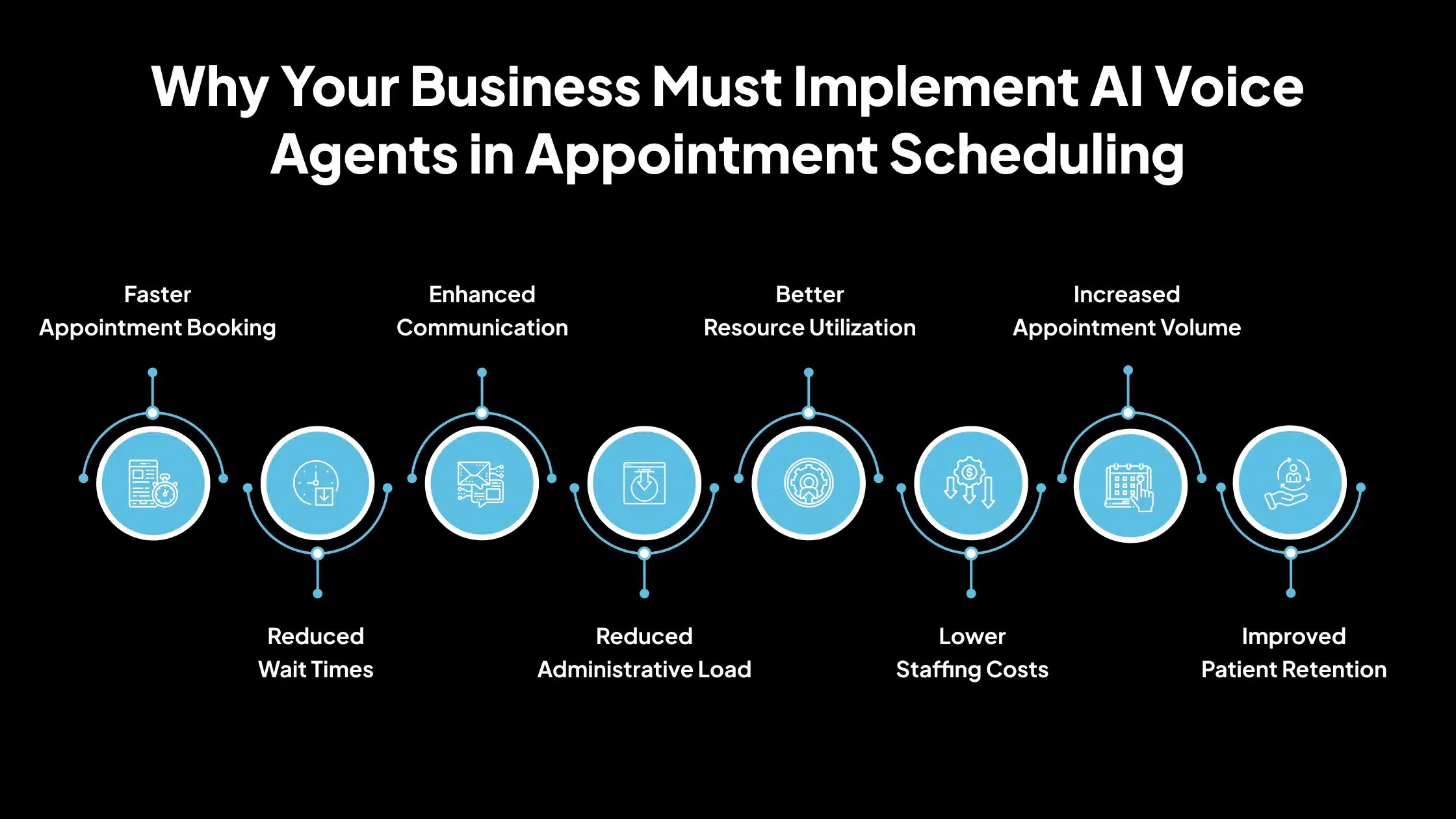
Below are the key reasons why adopting AI voice agents for appointment scheduling can benefit your practice.
Faster Appointment Booking
AI voice agents allow patients to schedule, reschedule, or cancel appointments instantly through voice commands. According to industry studies, nearly 70% of patients prefer self-service options over speaking with office staff for simple tasks, such as appointment management.
By offering instant scheduling at any time, voice agents eliminate waiting periods, ensuring that patients can manage their healthcare needs promptly without unnecessary delays.
Reduced Wait Times
Traditional appointment scheduling requires patients to call during office hours and often wait on hold due to high call volumes. AI voice agents remove this dependency by providing immediate assistance 24/7.
This round-the-clock accessibility enhances patient satisfaction, as studies show that long hold times contribute to frustration and appointment abandonment, with up to 30% of callers hanging up before completing their request.
Enhanced Communication
Voice agents also help reduce miscommunication through automated confirmations and reminders. Patients are more likely to attend appointments when they receive timely alerts.
Research indicates that automated reminders can reduce no-show rates by up to 40%, improving patient adherence to treatment schedules and ensuring better health outcomes.
Reduced Administrative Load
By automating routine scheduling tasks, voice agents free administrative staff from time-consuming inquiries and booking management. This allows staff to focus on complex patient care tasks and other essential duties.
Reports from healthcare providers using AI voice solutions indicate a 20–30% reduction in administrative workload, which directly contributes to improved staff productivity.
Better Resource Utilization
AI voice agents optimize appointment scheduling by aligning patient requests with staff availability and resource constraints. They analyze scheduling patterns and patient preferences to suggest the most suitable appointment times.
This helps ensure that provider calendars are utilized efficiently and appointment slots are maximized, without overbooking or idle time.
Lower Staffing Costs
With AI voice agents handling routine appointment tasks, healthcare practices can reduce the need for extensive front-desk staffing. This leads to cost savings without compromising service quality.
Increased Appointment Volume
Efficient, always-available scheduling through voice interactions allows practices to handle a higher number of appointments.
Real-time availability ensures that patients can easily access care when needed, increasing appointment bookings as patients are less likely to postpone care due to scheduling barriers.
Improved Patient Retention
Convenient scheduling and better communication contribute to higher patient satisfaction and trust. Patients who experience seamless appointment management are more likely to return for follow-ups and recommend the practice to others.
Best Practices for Integrating AI Voice Agents in Appointment Management
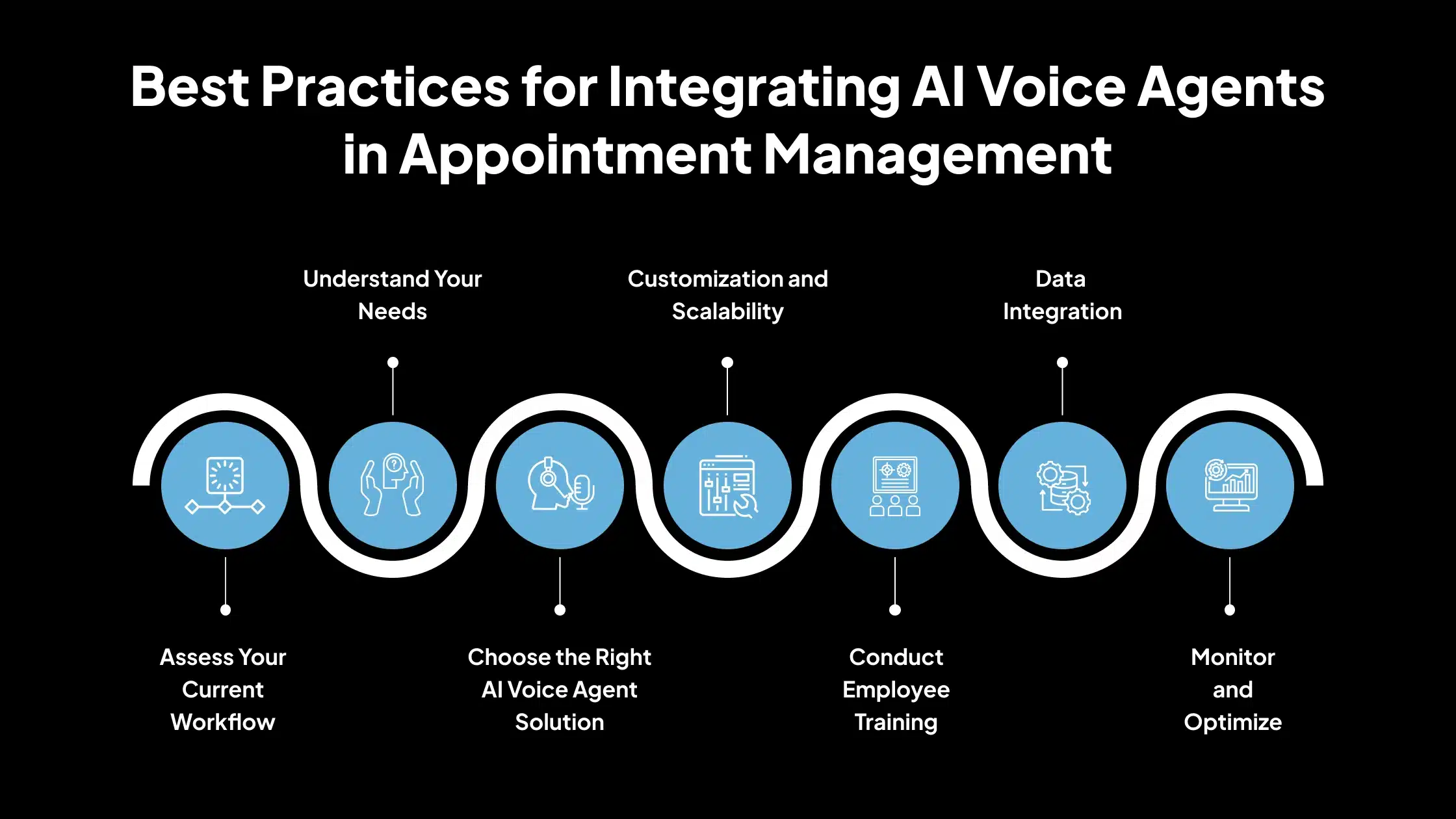
Here is a list of best practices for selecting the right solution, training staff, and optimizing performance to ensure a smooth transition and improved patient service.
Assess Your Current Workflow
Begin by reviewing your existing appointment scheduling process to spot areas that need improvement. Look for common issues such as missed calls, long hold times, booking errors, or repeated patient complaints.
Identifying these gaps helps determine where AI voice agents can add the most value and improve efficiency.
Understand Your Needs
Next, clarify the goals you want to achieve with AI voice agents. Determine whether you need the technology for basic tasks, such as appointment booking, or more advanced applications, like handling follow-ups, reminders, or patient inquiries. A clear understanding of your needs will guide you in selecting the right solution that fits your practice.
Choose the Right AI Voice Agent Solution
When selecting an AI voice agent, ensure that the solution integrates seamlessly with your existing systems, such as Electronic Health Records (EHRs) and Patient Management Systems (PMSs).
Integration helps maintain accurate patient data, reduces manual errors, and ensures that the voice system functions as part of your overall care delivery.
Customization and Scalability
Select a platform that can be personalized according to your practice’s requirements. Whether it supports multiple languages, customizes appointment workflows, or adjusts based on patient preferences, the solution should be flexible. Additionally, choose one that can scale as your patient base grows or as new needs arise.
Conduct Employee Training
Staff should be trained to work effectively alongside AI voice agents. This includes understanding how the system works, recognizing when to intervene, and managing escalations. Proper training helps ensure that voice agents enhance the scheduling process without disrupting existing workflows.
Data Integration
For the voice agent to function optimally, it must share data smoothly with other systems. Integrating the voice platform with patient records ensures that appointment details, preferences, and communication history are up-to-date. This improves scheduling accuracy and enhances personalized patient care.
Monitor and Optimize
Once the voice agent is implemented, continuously monitor its performance to ensure optimal operation. Analyze how patients interact with the system, identify the most frequently used features, and pinpoint areas where challenges are likely to arise. Collect feedback from both staff and patients to understand the system’s strengths and weaknesses.
Challenges in Implementing AI Voice Agents for Appointment Scheduling
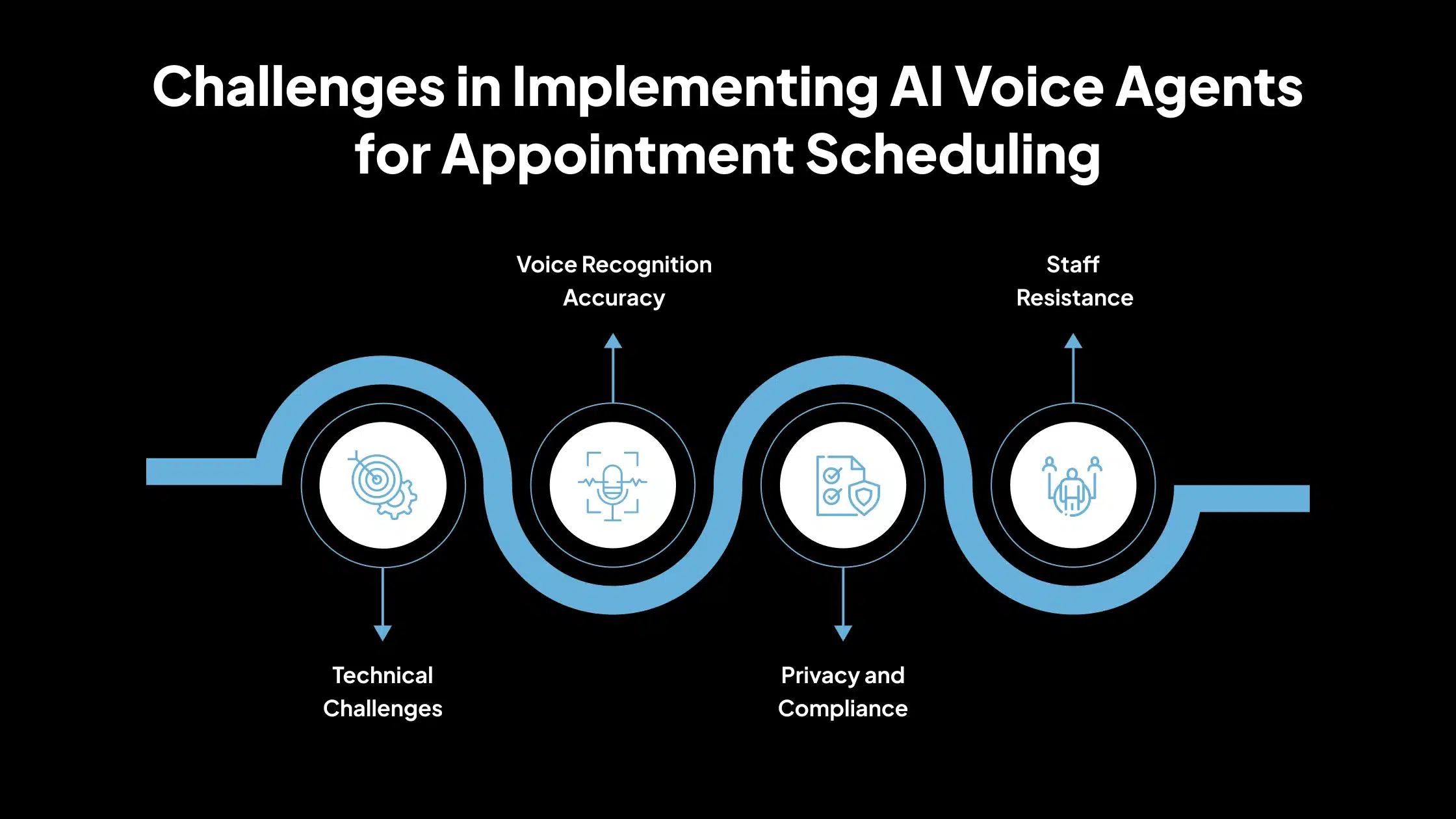
Here is a list of common challenges healthcare practices may face when implementing AI voice agents, along with key areas to address for a successful adoption.
1. Technical Challenges
For AI voice agents to function effectively, they must be integrated with existing healthcare systems, such as Electronic Health Records (EHRs) and Patient Management Systems (PMSs).
Without proper integration, patient information may not be updated accurately, resulting in scheduling errors or incomplete records. Ensuring seamless data sharing requires careful planning and coordination between technology providers and healthcare administrators.
2. Voice Recognition Accuracy
Voice agents rely on speech recognition technology to understand patient requests. However, variations in accents, pronunciation, and speech patterns can affect how accurately the system interprets commands.
Training the voice agent to recognize different speech nuances and handle interruptions is essential. Regular updates and continued learning based on patient interactions help improve accuracy over time.
3. Privacy and Compliance
Healthcare providers must ensure that all patient interactions through AI voice agents meet strict privacy and security standards. The system must protect patient data during transmission and storage, adhering to guidelines established by the Health Insurance Portability and Accountability Act (HIPAA). Working with vendors that offer encryption, access controls, and audit trails is necessary to maintain compliance and build trust.
4. Staff Resistance
Introducing new technology may be met with hesitation or concern from healthcare staff. Some may worry that the system will replace human jobs or may not function reliably.
Providing proper training, demonstrating how AI voice agents support their daily work, and involving staff in the implementation process helps ease concerns. Encouraging feedback and showing improvements based on user experience builds confidence in the system’s effectiveness.
How Do Avahi AI Healthcare Voice Agents Improve Patient Call Management?
Managing patient calls can consume a significant amount of time and resources in healthcare settings. Avahi AI Healthcare Voice Agents are designed to streamline call handling, allowing providers to focus more on delivering care while ensuring patients receive timely support.
Here is what Avahi’s AI voice agents can handle:
- Answer Routine Questions: The system responds to common patient inquiries about appointments, office hours, directions, and other relevant information.
- Book, Reschedule, and Cancel Appointments: Patients can manage their appointments in real time without waiting for office staff.
- Send Reminders and Follow-Ups: Automated alerts reduce no-shows and keep patients informed about upcoming visits.
- Route Urgent Calls: Important issues are flagged and directed to staff immediately, ensuring quick response when needed.
- Handle Insurance and Referrals: The AI assists with insurance-related questions, referrals, and call triage, thereby improving the patient experience and reducing confusion.
Built on AWS’s healthcare-ready cloud infrastructure, Avahi is HIPAA-compliant, SOC 2, and GDPR-compliant, ensuring patient data is handled safely and responsibly. The system can be implemented in practices of all sizes and integrates easily with existing scheduling tools and Electronic Health Records (EHRs). Explicitly designed for high-demand environments like dental, specialty, primary, and urgent care, Avahi helps reduce wait times and improve patient satisfaction.
Discover Avahi’s AI Platform in Action
At Avahi, we empower businesses to deploy advanced Generative AI that streamlines operations, enhances decision-making, and accelerates innovation—all with zero complexity.
As your trusted AWS Cloud Consulting Partner, we empower organizations to harness the full potential of AI while ensuring security, scalability, and compliance with industry-leading cloud solutions.
Our AI Solutions Include
- AI Adoption & Integration – Leverage Amazon Bedrock and GenAI to Enhance Automation and Decision-Making.
- Custom AI Development – Build intelligent applications tailored to your business needs.
- AI Model Optimization – Seamlessly switch between AI models with automated cost, accuracy, and performance comparisons.
- AI Automation – Automate repetitive tasks and free up time for strategic growth.
- Advanced Security & AI Governance – Ensure compliance, detect fraud, and deploy secure models.
Want to unlock the power of AI with enterprise-grade security and efficiency?Start Your AI Transformation with Avahi Today!
Frequently Asked Questions
1. What are AI Voice Agents for Appointment Scheduling?
AI Voice Agents for Appointment Scheduling are tools powered by artificial intelligence that allow patients to manage appointments through voice commands. These systems help reduce wait times, streamline communication, and improve access to care.
2. How can AI Voice Agents for Appointment Scheduling improve healthcare operations?
By automating routine tasks such as booking and rescheduling, AI voice agents reduce administrative workload and enable staff to focus on patient care. They also provide 24/7 availability, improving patient access and satisfaction.
3. Are AI Voice Agents for Appointment Scheduling secure for handling patient data?
Yes, reputable AI voice solutions are designed to meet healthcare data protection standards such as HIPAA. They ensure that patient information is encrypted and stored safely while offering efficient scheduling services.
4. Do healthcare providers need special systems to implement AI voice agents?
Most AI voice solutions integrate seamlessly with existing healthcare software, such as Electronic Health Records (EHR), making it easier for practices to adopt without overhauling their current workflows.
5. What challenges should I be aware of when using AI Voice Agents for Appointment Scheduling?
Common challenges include ensuring accurate voice recognition across accents and speech patterns, integrating with healthcare records, and training staff to adapt to new technologies. Addressing these upfront ensures a smoother implementation.
